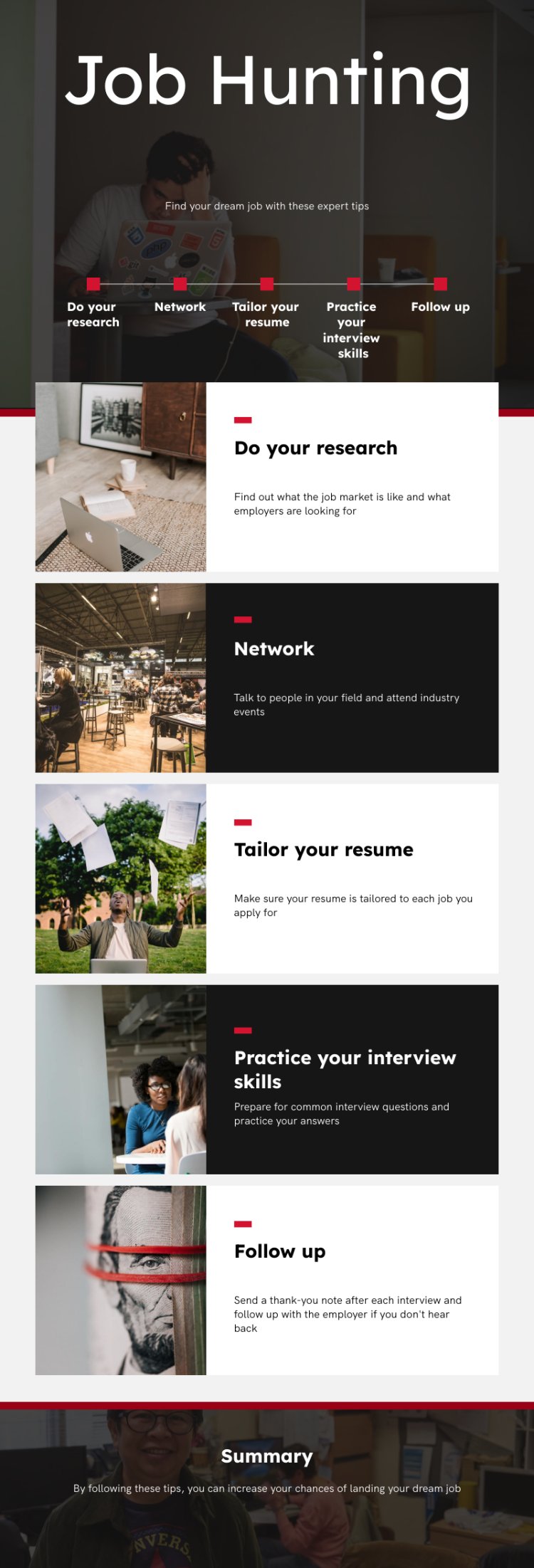Top 10 Job Hunting Strategies - Expert Tips for Landing Your Dream Job
Looking to advance your career or switch professions? Explore the best job hunting strategies to streamline your search and secure the perfect position. Our expert tips cover resume optimization, networking tactics, interview preparation, and more to help you land your dream job faster.

Table of Content
- 1. Understanding the Job Market
- 2. Crafting an Impressive Resume and Cover Letter
- 3. Building a Strong Professional Network
- 4. Utilizing Online Job Search Platforms
- 5. Networking Events and Job Fairs
- 6. Leveraging Social Media for Job Hunting
- 7. Developing a Personalized Job Search Plan
- 8. Interview Preparation and Techniques
- 9. Following Up and Staying Persistent
- 10. Seeking Career Advice and Mentorship
- 11. Professional Development and Continuous Learning
- 12. Overcoming Common Job Hunting Challenges
- Conclusion
In today's competitive job market, having effective job hunting strategies is crucial for landing your dream job. Gone are the days of simply submitting a generic resume and hoping for the best. Employers are looking for candidates who stand out from the crowd and demonstrate their value. By implementing the right strategies, you can increase your chances of finding job opportunities that align with your career goals and securing that coveted position. This article will guide you through the process of job hunting, providing valuable insights and tips to help you unlock success.
1. Understanding the Job Market
Before diving into your job search, it's important to have a clear understanding of the job market. Research the industry you're interested in, including current trends, in-demand skills, and salary expectations. This knowledge will help you tailor your resume and cover letter to highlight your relevant qualifications and experience. Additionally, understanding the job market will enable you to target your search towards industries and companies that are actively hiring.
2. Crafting an Impressive Resume and Cover Letter
Your resume and cover letter are your first introduction to potential employers. It's essential to craft these documents in a way that grabs attention and showcases your skills and experience. Tailor your resume to each job application, emphasizing relevant achievements and responsibilities. Use strong action verbs and quantify your accomplishments to make an impact. Your cover letter should complement your resume by highlighting your motivation, passion, and fit for the position. Proofread both documents meticulously to ensure they are error-free and present a professional image.
3. Building a Strong Professional Network
Networking is a powerful tool in today's job market. Building a strong professional network can open doors to hidden job opportunities and provide valuable career advice and mentorship. Attend industry events, join professional associations, and connect with professionals in your field through online platforms like LinkedIn. Cultivate meaningful relationships by offering help and support to others. Your network can provide insights into company cultures, refer you to job openings, and even advocate for you during the hiring process.
4. Utilizing Online Job Search Platforms
Online job search platforms have revolutionized the way we find job opportunities. Websites like Indeed, LinkedIn, and Glassdoor provide a vast database of job listings across various industries. Utilize the advanced search filters to narrow down your options and find positions that align with your skills and interests. Set up job alerts to receive notifications for new openings. Tailor your online profiles to showcase your skills and experience, making it easier for recruiters to find you. Don't forget to leverage the power of keywords in your job search to increase your visibility.

5. Networking Events and Job Fairs
Attending networking events and job fairs can be a great way to meet potential employers face-to-face and make a memorable impression. Research upcoming events in your area and prepare a concise elevator pitch that highlights your skills and goals. Dress professionally and bring copies of your resume to distribute. Engage in meaningful conversations and ask thoughtful questions to demonstrate your interest in the industry. Follow up with the contacts you've made to express your gratitude and maintain the connection.
6. Leveraging Social Media for Job Hunting
Social media platforms like LinkedIn, Twitter, and Facebook can be powerful tools for job hunting. Polish your online presence by updating your profiles, sharing relevant industry content, and engaging with professionals in your field. Join industry-specific groups and participate in discussions to expand your network. Follow companies you're interested in to stay updated on their latest job postings. Be mindful of your online reputation and ensure your social media profiles present a professional image that aligns with your career goals.
7. Developing a Personalized Job Search Plan
A personalized job search plan can significantly increase your efficiency and success in finding job opportunities. Start by setting clear goals and defining your target industries and companies. Break down your job search into manageable tasks, such as networking, online applications, and attending career events. Create a schedule and allocate dedicated time each day or week for job searching activities. Track your progress and adjust your plan accordingly. Remember, job hunting is a marathon, not a sprint, so stay focused and persistent.
8. Interview Preparation and Techniques
Once you secure an interview, thorough preparation is key to making a positive impression on potential employers. Research the company, its mission, and its values. Familiarize yourself with common interview questions and prepare thoughtful answers. Practice your responses to ensure you come across as confident and articulate during the interview. Dress professionally and arrive early to the interview location. Don't forget to bring copies of your resume and any supporting documents. Follow up with a thank-you note or email to express your appreciation for the opportunity.
9. Following Up and Staying Persistent
Following up after job applications and interviews is crucial to demonstrate your interest and professionalism. Send a personalized thank-you note or email to the hiring manager or interviewer within 24 hours of the interaction. Express your gratitude for their time and reiterate your enthusiasm for the position. If you don't hear back within the expected timeframe, don't be afraid to follow up with a polite inquiry. Persistence can pay off, and it shows your dedication and commitment to securing the job.
10. Seeking Career Advice and Mentorship
Seeking career advice and mentorship from experienced professionals can provide valuable insights and guidance throughout your job hunting journey. Reach out to mentors in your industry or join mentorship programs offered by professional organizations. Ask for their advice on job search strategies, resume critiques, and interview tips. Their wisdom and experience can help you navigate the challenges of job hunting and make informed decisions about your career path.

11. Professional Development and Continuous Learning
Continuous learning and professional development are essential for staying competitive in today's job market. Take advantage of online courses, webinars, and workshops to enhance your skills and expand your knowledge. Certifications and additional qualifications can give you a competitive edge over other candidates. Stay up-to-date with industry trends and adapt your skills accordingly. Employers value candidates who demonstrate a commitment to growth and improvement.
12. Overcoming Common Job Hunting Challenges
Job hunting can be a challenging and sometimes frustrating process. It's important to stay positive and resilient throughout the journey. Set realistic expectations and understand that rejection is a normal part of the process. Seek support from friends, family, or career counselors to help you stay motivated and focused. Take breaks when needed to avoid burnout and maintain a healthy work-life balance. Remember, each setback is an opportunity for growth and self-improvement.
Conclusion
Effective job hunting strategies are vital for landing your dream job. By understanding the job market, crafting an impressive resume and cover letter, building a strong professional network, and utilizing online platforms and social media, you can increase your chances of finding job opportunities that align with your career goals. Developing a personalized job search plan, preparing for interviews, and following up persistently will set you apart from other candidates. Seek career advice, invest in professional development, and overcome common job hunting challenges to unlock success in your job search. Remember, with determination and the right strategies, your dream job is within reach.
CTA: Start implementing these effective job hunting strategies today to unlock success and land your dream job!
What's Your Reaction?




















